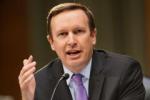
President Trump has stuck his foot in his mouth yet again. In an Axios story published Sunday, Trump was quoted as saying, of the prospect of a meeting with Venezuelan dictator Nicolás Maduro, “I would maybe think about that. . . . Maduro would like to meet. And I’m never opposed to meetings — you know, rarely opposed to meetings. . . . I always say, you lose very little with meetings. But at this moment, I’ve turned them down.” When asked about Juan Guaidó, the opposition leader whom he recognized as the president of Venezuela on January 23rd, Trump expressed doubts. “Guaidó was elected. I think that I wasn’t necessarily in favor, but I said — some people that liked it, some people didn’t. I was OK with it. I don’t think it was — you know, I don’t think it was very meaningful one way or the other. . . . I could have lived with it or without it, but I was very firmly against what’s going on in Venezuela.”
Trump’s remarks were, to put it mildly, problematic, especially on two levels.
First and foremost, the socialist Maduro regime has inflicted massive humanitarian, economic, and political crises on Venezuela. Its actions have led to widespread starvation, an inflation rate of 15,000 percent, and the exodus of over four million Venezuelans from the country. Trump recognized Guaidó as the elected interim president of Venezuela after Maduro’s tainted reelection victory in 2018. In the statement that accompanied the move, he noted that the Maduro regime is “illegitimate” and would be held “directly responsible for any threats it may pose to the safety of the Venezuelan people.” Since then, the Trump administration has mounted a “maximum pressure” campaign against the regime, unveiling further sanctions on oil exports and high-ranking Maduro loyalists, greatly expanding its military presence in the Caribbean in an effort to cut off the regime’s access to illicit revenue streams, and indicting Maduro and 14 associates on drug-trafficking charges.
By appearing to nod vaguely in Maduro’s direction on Sunday, Trump risked undermining those policies.
Second, Trump’s muddled messaging could have serious consequences for his reelection. In the wake of the Axios story, Florida Republicans such as Rick Scott and Marco Rubio were quick to say that a potential meeting with Maduro would be a mistake. According to the Washington Post, other Florida Republicans came forward anonymously to condemn the president’s actions. One pointed out that Trump had endangered his hold on conservative Cuban and Venezuelan voters in Florida, a key state in the upcoming election that is also home to the largest Cuban and Venezuelan populations in the country.
Given all this, the backlash to Trump’s comments was understandably swift and fierce. And as has so often happened when Trump has found himself in the middle of such self-inflicted controversies, the administration and its allies quickly pivoted into damage-control mode. When asked, White House press secretary Kayleigh McEnany insisted that Trump was still loyal to Guaidó. Rubio, who has been a strong and consistent critic of Maduro, told Politico: “What [the Trump Administration] has made clear it will not do is negotiate with the Maduro regime remaining in power or allow negotiations to be used as a delay tactic.” And Trump himself saw fit to walk back his statements in a tweet the next day:
Unlike the radical left, I will ALWAYS stand against socialism and with the people of Venezuela. My Admin has always stood on the side of FREEDOM and LIBERTY and against the oppressive Maduro regime! I would only meet with Maduro to discuss one thing: a peaceful exit from power!
— Donald J. Trump (@realDonaldTrump) June 22, 2020
Thus was the familiar Trump cycle of inscrutable-yet-worrisome remarks, instant outraged responses, and White House retreat complete (not to mention the signature defensive Twitter episode). In the end, as is typically the case, though we were left with reasons to doubt Trump’s character and fitness for office, there were few if any concrete changes in U.S. policy. But perceptions of one’s character and fitness for office matter quite a bit in politics, especially when you’re a historically unpopular incumbent asking the nation’s voters to reelect you in just over four months’ time.




